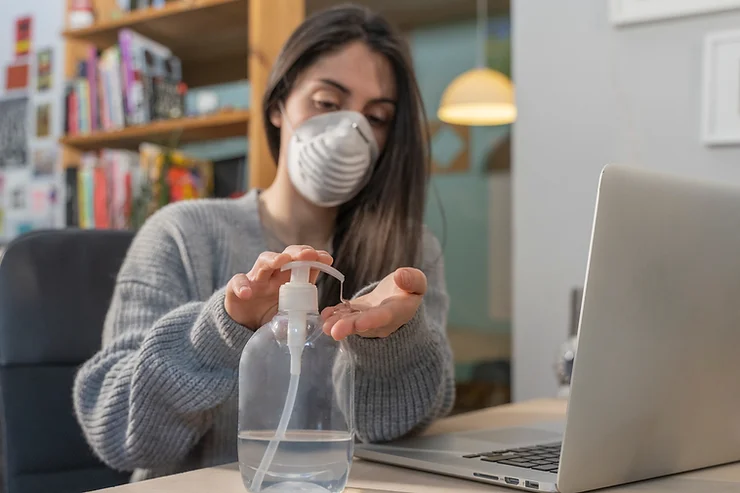Pierre is a leading college and graduate admissions consultant with extensive experience in education and entrepreneurship. His advice has been featured on Forbes.com, U.S. News, CNN Business, the Washington Post, ABC News, Business Insider, and more.

COVID-19 has drastically changed the lives of graduating high school seniors. From cancelling prom and graduation to having to finish classics and take classes online, the academic and social lives of students have been uprooted. As a result, students’ college applications are going to look fundamentally different. Extracurricular activities and competitions have been cancelled, community service of any sort is difficult to perform, and teacher recommendations are likely to be less informed.
Naturally, students will want to use some space in their college applications to address the coronavirus’ impact. This requires, however, both careful maneuvering of the subject and an understanding of how to frame your experience in the context of your high school career and global events. Writing about COVID-19 in the wrong way can doom your application to the reject pile instantly, while writing about it in the right way can give you a huge boost.
How NOT To Write About COVID-19 On Your College Applications
The central challenge of writing about COVID-19 in an application essay is actually very similar to writing about other common topics on college application essays. Divorce, death of a family member or friend, medical conditions, and injuries are frequent topics of application essays, but they are often written about in a way that reads to an admissions officer as complaining.
In addition, it can be hard to keep the focus of an essay on the student when these over topics are covered. These are such emotionally heavy subjects that they often draw the reader’s attention and make it hard to pay attention to anything else. Many students introduce such subjects in the very first paragraph of their personal statement, the most important essay, and then continue to discuss the extent of the tragedy for more than half the essay. This is not only often very challenging to read, but it also ends up telling the reader very little about the student.
Many students also commonly feel the need to write an academic-style introduction when discussing a current event. For example, when talking about their volunteering at a local homeless shelter, a student might begin by citing statistics about homelessness in the US and internationally. A student might also tell a specific story about a homeless person they interacted with to personalize the problem. Neither of these effectively show the admissions officer what the student learned from their volunteer experience. Similarly, you should not include any coronavirus statistics or general information in your application, especially not in your personal statement.
How To Appropriately Address COVID-19 On Your Application
“Community disruptions such as COVID-19 and natural disasters can have deep and long-lasting impacts. If you need it, this space is yours to describe those impacts. Colleges care about the effects on your health and well-being, safety, family circumstances, future plans, and education, including access to reliable technology and quiet study spaces.
Do you wish to share anything on this topic? Y/N
Please use this space to describe how these events have impacted you.”
For the coming admissions cycle, you have the opportunity to discuss how COVID-19 impacted you on your application. However, as discussed above, you don’t really want to list the various detriments to your social and academic life. It is okay to mention something that significantly hurt your academic performance or prevented you from continuing an activity, but this should not be the bulk of this section. Instead, it is most productive to briefly mention a few ways you have been affected followed by a more thorough discussion of how you responded to these challenges.
For example, the fact that coronavirus prevented you from participating in your favorite Model UN conference of the year does little to convince admissions officers you’re a great candidate for their school. However, mentioning this quickly and following it up with a discussion of how you planned a virtual conference or continued to practice debate skills over virtual club meetings may demonstrate your creativity and resilience. If you haven’t yet, now is a good time to think about how you can continue your activities or pursue new opportunities in creative ways.
In the 250 words you have to respond to this prompt, you have plenty of space to list a few coronavirus-related changes in your life (50-100 words) and flesh out some impressive ways you responded (150-200 words).
Lastly, don’t feel the need to write a full 250 words if you were/are genuinely mostly unaffected by the virus. Avoid talking about ways you were affected that are minor or very common–not being able to hang out with friends or not going to school–as these will seem like complaining. Admissions officers would rather read a short fifty words about how you took an online python course than 250 words about how tragic it was that your favorite beach was closed.
Summary
Don’t make COVID-19 the focus of your application, and try to avoid more than one or two sentences about it on your personal statement. Many people will be writing about the pandemic on their application, so writing about it extensively will do little to help you stand out. You want your applications to be about you, your interests, your personal growth, and your ability to be a future leader. Discuss COVID-19 in the context of how you responded to it and overcame some of the challenges it posed as much as possible.
Life is full of challenges, and college is no different. Showing admissions officers you know how to overcome those posed by a global pandemic will help demonstrate your high potential for success at university and beyond.
If you need any help with your college application, our team of Ivy League consultants is ready to provide you with the guidance you require.




